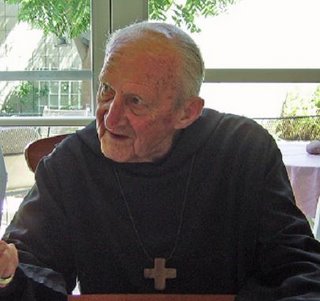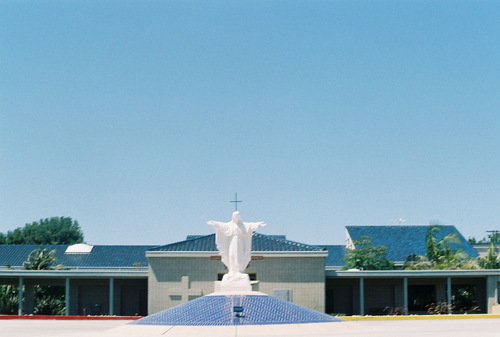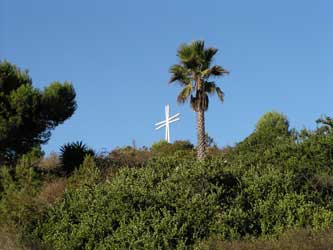Friday, September 28, 2007
A Saintly Man

How rare it is to meet a truly saintly person. Abbot Claude of Prince of Peace Abbey was such a one. He passed away this week just short of his 99th birthday. He was a monk for 77 years, and an ordained priest for 73. Abbot Claude was one of the most friendly, open-minded, and thoughtful spiritual adepts I’ve met. I remember once watching him walk by two other brothers of the order, and after he passed by, one said to the other, “There’s a real saint.” Now, this title has not been officially applied to Abbot Claude by the Catholic Church, given their stringent religious requirements for bestowing such an honor. One of these requirements is for the person to perform at least two documented miracles, and I think that if you can live with people for so many decades and they still call you a saint when you walk by, that should qualify as some sort of miracle! It’s one thing for visitors to see your greatness, but these brothers lived with him day in and day out, and they love to share how he was always the first to arrive at the early morning prayers, and that he was always cheerful and faithful to their many holy hours and practices.
Today, I attended his farewell mass for many reasons. First, even though Abbot Claude and I had only met and chatted seven or eight times, I consider him to be one of my very closest soul friends. We met in 1997, just before my first book – the memoir Never to Return – was published. My publisher and I drove up to Oceanside to look for one of the old missions we’d heard about. We found one, and were told about an active Benedictine Abbey down the road and up on top of a hill. As we drove up the hill, I received a strong intuitive insight. I don’t usually go around playing psychic, nor do I get too focused on what may or may not have happened in previous lifetimes and whatnot, but I wanted to share this with my friend, and told him, “I just got a hit that I’m going to meet a very dear friend from a previous lifetime.”
 We walked into the reception area where people were milling about drinking tea and coffee before the evening vespers. Across the room, I saw an older man dressed in a black robe. As we entered the room, this monk looked over, excused himself from his conversation, and came walking up to me, saying, “Don’t we know each other?”
We walked into the reception area where people were milling about drinking tea and coffee before the evening vespers. Across the room, I saw an older man dressed in a black robe. As we entered the room, this monk looked over, excused himself from his conversation, and came walking up to me, saying, “Don’t we know each other?” I smiled and replied, “Yes, but not from this lifetime!” Which incidentally was the same response I had given years earlier to Johnny Depp while meeting him in his trailer during the filming of Don Juan De Marco, when he kept insisting over and over that we had met somewhere before (as if! Maybe during my decade of monastic ashram life?).
Abbot Claude had beautiful blue eyes and a truly saintly smile. He invited us to join him for dinner after the vespers, and our friendly meeting continued there with great conversation. He was anything but stiff, and enjoyed hearing me share some favorite Sufi poetry and other stories.
Soon after, my memoir was published, and I sent one of the first copies to my new old friend, Abbot Claude. He wrote a generous letter back, saying that he’d read the book in one sitting, that he’d enjoyed it, and that he was confident there would be more. Abbot Claude was in charge of the oblates at the time – these are students who lived in the world but took on certain monastic practices in conjunction with the monastery. The next thing you knew, he was giving them my memoir to read and recommending that they read the book.
At one point, I met a few of these oblates, and they confided that “We don’t know why he’s having us read this book about your time in an Indian ashram, but he says that your approach to the challenges of that life demonstrates Benedictine principles.”
After sending Abbot Claude the book, I didn’t come for another visit until a year later. The monastery was a bit of a drive, and I was in a hermit phase where I didn’t travel too far from home. When I arrived, I asked one of the monks to call him out, hoping that he’d remember me.
Abbot Claude came over to me and – as if he were my Jewish mother – said, “Well, why didn’t you tell me you were coming? I would have called out the band! What took you so long to come back? I’ve been worrying about you every night. I keep your book on the little shelf above my bed.”
But my delay was forgiven, and we again shared a meal together after the prayers, as we did whenever I’d visit. Over and over when we met, Abbott Claude would look at me with an intrigued smile, shake his head, and say, “I just can't figure you out. You’re a mystery.” He was referring to the spiritual maturity he thought was demonstrated in certain circumstances described in my memoir and in our conversations, in contrast to my atheist upbringing in a somewhat dysfunctional family. He couldn’t understand how the spiritual transformation had come to be. Of course, he didn’t have religious beliefs in reincarnation, nor did he know about the tradition of shaktipat – where the touch and presence of a meditation master can awaken your consciousness well beyond any spiritual state you may have apparently earned.
 Every time I met with Abbot Claude, I’d return home with a feeling of having been in the company of a very pure being who had a deep spiritual love and acceptance for many – especially those like me who were a little out of the box and may have been ignored or dismissed by most adherents of such a strict religion. He gave self-respect with a smile.
Every time I met with Abbot Claude, I’d return home with a feeling of having been in the company of a very pure being who had a deep spiritual love and acceptance for many – especially those like me who were a little out of the box and may have been ignored or dismissed by most adherents of such a strict religion. He gave self-respect with a smile.During our 10 years of friendship, I thought of Abbot Claude at least every week, and sometimes did feel a little guilty for not visiting him more often, but I also knew that it was fine to feel our connection from a distance. When I received the letter about his passing, I knew that I had to go to visit him one more time. His face and demeanor couldn’t have looked more peaceful. The variety of people attending gave testament to his generous acceptance of all. I knew that this was a funeral for someone who must be bound for heaven. if anyone was a shoe-in, it was Abbot Claude.